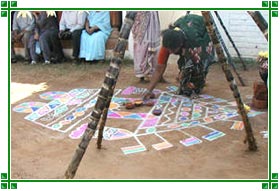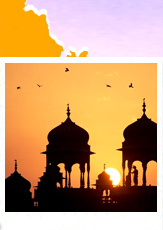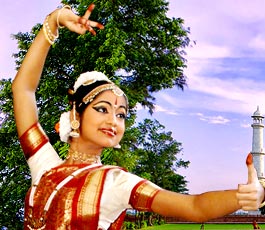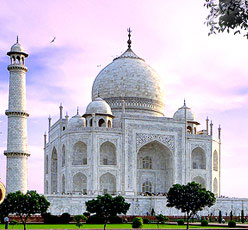 The land of tradition and culture, Tamil Nadu is
deeply entrenched in strict religious observances that borders around
orthodoxy. While some of the festivals are just agrarian and pastoral in
nature, others are connected with more fantastical mythology. Yet others
are famous temple festivals that feature music and dance and the
festivals to promote tourism. The festivals of Tamil are marked with
awe-inspiring rituals. The Cape festival at Kanyakumari is marked with a
series of cultural programs and is believed to be the wedding
anniversaries of the divine couples of Parvati and Parameshwara, Muruga
and Devasena, Andal (also known as 'Kothai') and Rangamannar and Rama
and Sita. The highlight of the festival is the procession of Lord
Kallazhagar (form of Lord Vishnu), the elder brother of Goddess
Meenakshi, who proceeds from his abode to give away his sister in
marriage to Lord Sundareshwar.
The land of tradition and culture, Tamil Nadu is
deeply entrenched in strict religious observances that borders around
orthodoxy. While some of the festivals are just agrarian and pastoral in
nature, others are connected with more fantastical mythology. Yet others
are famous temple festivals that feature music and dance and the
festivals to promote tourism. The festivals of Tamil are marked with
awe-inspiring rituals. The Cape festival at Kanyakumari is marked with a
series of cultural programs and is believed to be the wedding
anniversaries of the divine couples of Parvati and Parameshwara, Muruga
and Devasena, Andal (also known as 'Kothai') and Rangamannar and Rama
and Sita. The highlight of the festival is the procession of Lord
Kallazhagar (form of Lord Vishnu), the elder brother of Goddess
Meenakshi, who proceeds from his abode to give away his sister in
marriage to Lord Sundareshwar.The internationally acclaimed Mamallapuram Dance Festival starts on 25th of December every year and features classical and folk dance and music performances. Then there is Saral Festival of Courtallam, which is remarkable for rare and a pleasant experience to stroll in the 'Saral' monsoons where one neither gets wet nor remains dry. The healing waters of the Courtallam falls are renowned for their medicinal properties. Annual Tea and Tourism Festival of Ooty in Nilgiris, Summer Festivals and Chennai Music and Dance festival are some other popular festivals celebrated here. However, we are discussing here the most prominent of the Tamil Nadu festivals.
Pongal:
The harvest festival of Tamil Nadu marks the withdrawal of the southeast monsoons and happy days of reaping of the harvest. Basically a rural festival, it is celebrated in the month of Thai (that falls in January) for four days. The two most popular legends associated with Pongal associates the first day of the festival to the event when Lord Krishna lifted the gigantic Govardhan Mountain on his little finger to shelter people from heavy rains and wrath of the Rain God, Indra. The third day of Pongal is said to be the day for animals as it was on this day that Lord Shiva ordered Nandi Bull to forever help humans with their farming activities as a punishment for mixing up the message he sent to the people of Earth.
Natyanjali Dance Festival:
The festival in the honor of the great Cosmic Dancer or Lord Natraja (a form of Lord Shiva) is held every year in Chidambaram during February or March. This five-day long festival starts from the auspicious occasion of the Maha Shivaratri day. According to the Hindu mythology, Lord Nataraja is the Lord of Dances and hence the festival features dance performances in the 'Prakara' of the magnificent Chidambaram temple, which is dedicated to Lord Shiva. The 1000-year old temple provides a fitting backdrop to the spectacular event taking place under the golden roof of the temple showing pillars that depict Lord Nataraja in the classic 108 poses from the classical dance form of Tamil Nadu known as Bharatanatyam.
Kavadi Festival:
The festival dedicated to Lord Muruga (a form of Lord Shiva), 'Kavadi' is much more than fulfilling the vow to the Lord in exchange of some wish-fulfillment, it is one of the most awesome festivals of India that makes one wonder whether there is more to the world than one can sense through one's sense organs. The vows range from simpler ones to the painful ones, which are claimed to be the result of the supreme love for God. It is said that once the worldly wish is fulfilled, the devotee takes the Kavadi and in the process comes so close to God that he attains the supreme state of devotion.
Karthigai Deepam:
The oldest festival of Tamil Nadu and South India, Karthigai Deepam has been mentioned and referred to in many ancient works of Tamil literature such as 'Tolkappiyam' that dates back to 2,000 or 2,500 BC, 'Jeevakachintamani', an epic written by Jain poet, Thiruthakka Thevar, in the Sangam period, 'Karnarpadu', 'Kalavazhi Narpadu' dating around 1,000 BC and 'Pazhamozhi'. It falls in the month of Karthigai when the star Krithigai is on the ascendant according to the Tamil Calendar on a full moon day. It is believed that Lord Muruga, the divine light of Lord Shiva, took his form during this month. The ten-days festival is also known as 'the Festival of Lights' and is said to be the extension of the Deepavali festival of India.









